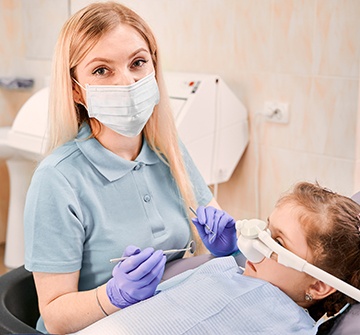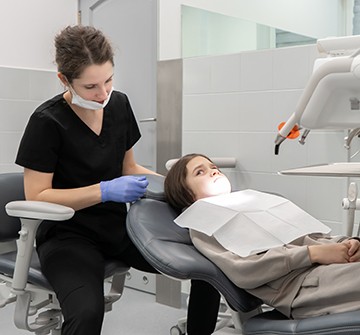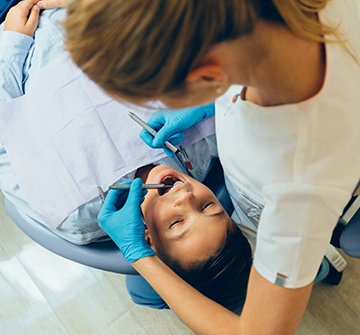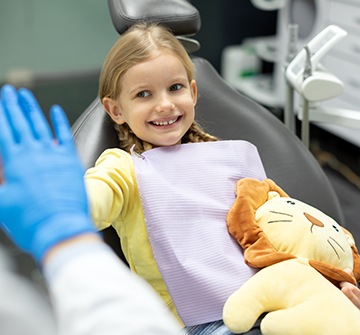Sedation Dentistry for Kids – Pelham, NH
Keeping Little Ones
Comfortable & Calm
You don’t need a degree in dentistry to know that many children aren’t exactly fans of going to the dentist. In fact, some are downright terrified, which can turn routine appointments into stressful experiences for children and parents alike. If your child normally feels nervous visiting the dentist, we can use safe and effective sedation dentistry to help calm their lingering nerves. Thanks to this and our team’s warm and gentle approach, we can promise that your child’s next appointment will be a breeze from check-in to checkout. To learn more about their options for sedation dentistry in Pelham, NH and which one might be best, contact us today.
Why Choose Us for Sedation Dentistry for Kids?
- Sedation available to help with any procedure
- Ready to serve children of all ages
- Happy to welcome children with physical, mental, & behavioral special needs
Nitrous Oxide Dental Sedation

You’ve probably heard nitrous oxide referred to by a sillier name—laughing gas! Thankfully, when children breathe in this colorless, odorless gas, it won’t reduce them to giggles, but rather help them quickly relax in the dental chair. As a result, it’s a popular solution for those that struggle with dental-related anxiety, have a hard time staying relaxed during their treatment, or need extensive care. To learn more about this calming sedation option, read on!
Who Is a Good Candidate for Nitrous Oxide?

If your child is scared of going to the dentist, they need a more extensive treatment (like root canal therapy), or they have a mental or physical disability that prevents them from staying calm in the dental chair, they may be a good candidate for nitrous oxide. Of course, our knowledgeable team will need to review their medical history before confirming that’s the case. For example, if your child has trouble breathing, then nitrous oxide will not be the best option. Don’t worry – we can present other solutions as well to ensure your child gets the essential care they need in the calming environment they deserve.
How Does Nitrous Oxide Work?

Nitrous oxide is a gas that is administered through a small nasal mask, which stays on for the entire appointment. In addition to being fast-acting and effective, it’s so gentle that it can be safely used with even the youngest children. Plus, our team will carefully monitor their vitals throughout to ensure they are perfectly okay. At the end of their treatment, we will remove the mask, and the effects will dissipate almost instantly.
Aftercare for Nitrous Oxide

Since there aren’t any lingering effects once the mask is removed, aftercare for nitrous oxide is quite easy. In fact, your child will be able to go straight back to school after their appointment! Just make sure they continue to drink plenty of water, eat well-balanced meals, and implement a solid oral hygiene routine to keep their oral health in tip-top shape. If their mouth was numbed for their treatment, then encourage them to wait to eat until they’ve fully regained feeling in their mouth. That way, they won’t accidentally bite their lip or tongue.
General Anesthesia

It’s possible that your child might require lengthy or complex dental treatment – or they might be seriously anxious about their upcoming visit. For these scenarios, we may recommend general anesthesia. It’s a safe, reliable option that’s perfect for younger patients who may not be able to benefit from other sedation solutions. To learn more about general anesthesia for kids or to see if your little one would be a good candidate, please feel free to contact our Pelham office!
What Is General Anesthesia?

In a broad sense, general anesthesia refers to medications that put patients into unconscious states, so that certain procedures can be performed more easily and painlessly. This is different than “local” anesthesia, which involves simply numbing a specific area that requires treatment. General anesthesia has remarkable usefulness when it comes to pediatric dentistry; children aren’t always confident or compliant when it comes to dental procedures, and general anesthesia makes things much smoother and more streamlined for all parties involved.
Who Is a Good Candidate for General Anesthesia?

There are a few scenarios when we might recommend general anesthesia for your child. Typically, it’s used for apprehensive and younger children who need extensive dental treatment, as well as those with special needs that would not work well under other sedative options. It can also provide an emotionally positive experience to children who have a history of traumatic dental experiences, as well as those with very strong gag reflexes.
We will always carefully evaluate your child’s health and behavior to help you make an informed decision about dental sedation; however, you can be assured that they’ll be in the most capable hands!
How General Anesthesia Works

With general anesthesia, the patient will be unconscious during the entirety of the procedure. Their muscles and reflexes will be totally relaxed, and they won’t feel an ounce of pain during their procedure. Normally, an oral medication is given first, making your child feel drowsy (nitrous oxide can also be used). Afterward, an IV is started that provides the right dosage of drugs directly into their bloodstream, which puts them to sleep and nulls their senses. Most procedures can be completed within 30 minutes to 1.5 hours.
Note that when anesthesia is needed, there are special rules for eating and drinking at home before the procedure, and your child will have some restrictions after the procedure. Some mild side effects including sleepiness, nausea, and other similar symptoms might also occur following treatment. We’ll thoroughly review all of this information with you before and after your child’s visit.
The Benefits of General Anesthesia

General anesthesia offers numerous benefits when used in pediatric dentistry, including:
- Children will not be traumatized by the extent of their dental work since they’ll be unconscious. Many won’t even remember much about their appointment.
- A patient’s vitals are closely monitored during their procedure to ensure that there aren’t any unexpected issues or complications, however unlikely they might be.
- It allows complex or lengthy treatments to be performed on children with special needs or other accommodations, all in a single visit.
Sedation Dentistry for Kids FAQs
Is sedation dentistry safe for kids?
Yes, sedation dentistry has been extensively tested, and it is safe for children who are candidates. So, if your child struggles with mild, moderate, or extreme dental-related anxiety, talk to our Pelham dental team about nitrous oxide or general anesthesia! Once we review their dental history, learn about their allergies, and hear about your concerns, we can determine if they are a candidate and, if they are, add sedation dentistry to their treatment plan.
Is sedation dentistry covered by insurance?
Typically, sedation dentistry is classified as a “luxury” and, therefore, is not covered by dental insurance. That said, there are some exceptions. For example, if your child has a mental, behavioral, or physical disability that makes getting the care they need impossible without it, there’s a chance that your provider will cover the cost. The same applies if your child needs extensive care, like multiple tooth extractions. Ultimately, the best thing to do is to familiarize yourself with their benefits and reach out to the helpline provided if you have any questions. Our team at Simply Pediatric Dentistry and Orthodontics is also here to help, so don’t hesitate to bring any questions you have to us.
Is sedation dentistry worth it?
If sedation dentistry isn’t covered, resulting in you having to pay for the entire cost out-of-pocket, then you might be wondering if it’s really worth it. If your child struggles with considerable dental-related anxiety, they need extensive care, or they have a sensitive gag reflex that makes their time in the treatment chair miserable, then the answer is “yes!” Plus, there are other ways to make the price of sedation dentistry more affordable, like CareCredit flexible financing.
How long does dental sedation last?
The answer depends on the type of sedation your child is receiving. The effects of nitrous oxide, for example, dissipate completely within a matter of minutes. So, your child won’t have any lingering grogginess; they can go straight back to school after their appointment, if needed! As for general anesthesia, sleepiness and nausea are to be expected. Rest assured, we will review all of this information with you upfront so you know what to do before and after your child’s appointment. That way, their entire experience is as smooth and stress-free as possible.
Can dental sedation make you sick?
Nausea with nitrous oxide is pretty rare. With general anesthesia, it’s more common. That’s why we will provide you with specific instructions, like having your child fast prior to their appointment. Again, we will cover all of this information with you at the initial appointment. That way, you can prepare ahead of time and ask any questions you have beforehand.
